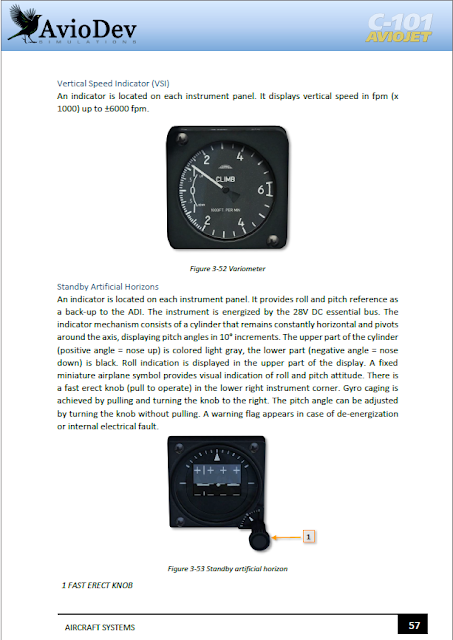Aviodev C-101 for DCS World - Review
Aviodev CASA C-101
Following the recurring theme in DCS modules, it was released in early access. The promised features were a C-101EB and C-101CC with AFM (advanced flight model).
As of today, the C-101 is only available at the DCS Store, but will also be on Steam when the C-101CC and AFM is ready.
The real aircraft
The C-101EB is an advanced trainer designed by CASA based on a request made by the Spanish Air Force to have an aircraft capable of replacing the HA-200 Saeta.
The Aviojet did its first flight on June of 1977, and it entered service three years later. Over 80 units were built for the SpAF, of which 8 went to the Patrulla Aguila (SpAF aerobatic team).
C-101's have Garrett TFE731 engines, which provide 15,8 kN of thrust.
It's a very maneuvarable aircraft, able to fly inverted for over half a minute and land at low speeds. It includes "simple" avionics systems, only the necessary ones to train new pilots.
What do you get when buying Aviodev's C-101?
Currently you get the C-101EB with SFM (simple flight model), as well as a few extras. You can easily create some more with DCS's excellent mission editor or search for them online.
 |
| A handful of missions |
 |
| Instant action |
 |
| The only training mission included |
 |
| Example page from the flight manual |
 |
| Excerpt from the C-101CC manual |
The C-101EB manual consists of 118 pages, and the -CC's one has some more pages. Both of them are thoroughly illustrated with high resolution images.
Installation
As all DCS modules, the Aviojet is installed via the in-game module manager, and with just a few clicks you get the job done.
The download size sits around 600MB.
So, how does it fly?
As mentioned before, the Aviojet uses SFM. This kind of flight model is more arcade-ish than anything else, and this is quite noticeable coming from aircraft like the A-10C or L-39.
This mostly shows while on the ground, where the airplane behaves like it's on rails.
Keep in mind that this is an early access, and that Aviodev is working hard to get the advanced flight model ready as soon as possible.
The cockpit
In my opinion the most important part of a module. As expected, you get an interactive cockpit.
The startup procedure involves quite a few steps, but is explained on the only training mission included with the aircraft. Most beginners will surely grasp this procedure quickly.
The C-101 is a two-seater, and Aviodev modelled both the front and rear panels in a beautiful fashion.
 |
| Front seat |
 |
| Rear seat |
Also, the compass shows deviation after some time, something I haven't seen on other modules.
On another note, the guys from Aviodev were also kind enough to send me some C-101CC cockpit screenshots, take a look below and you'll know what to look forward to!
 |
| Front panel of the C-101CC |
 |
| Notice the attention to detail on every corner of the cockpit! |
Another important feature of this module is multicrew. As of today, although the option is there, it's not working. If you select the rear seat your simulator will crash. Keep in mind that this happens only in multiplayer.
This is another feature that will be added as soon as the advanced flight model is ready.
The external model
This is one of the strong points of the Aviojet. The external model looks fantastic!
Aviodev included some features like a custom ground power unit, stairs and chocks. They also added some small details like the pilots helmet outside the cockpit during a cold start-up.
 |
| The pilots helmet and the stairs |
 |
| Small details that make everything look more real |
Another nice feature is the dynamic tail/nose number system. In short, if you spawn two C-101's they will have different titles, something that adds even more realism.
Take a look below:
 |
| Notice the armament it's carrying |
The C-101CC's external model is already complete, and it looks stunning.
Regarding liveries, the Aviojet ships with various Spanish Air Force liveries and a fictional USAF trainer one. The -CC variant has Chilean, Jordanian, Spanish and Honduran textures.
Combat use
Regarding liveries, the Aviojet ships with various Spanish Air Force liveries and a fictional USAF trainer one. The -CC variant has Chilean, Jordanian, Spanish and Honduran textures.
Combat use
The C-101CC is comparable to the Hawk in combat.
It can carry a DEFA cannon, two AIM-9, rocket pods, bombs, cluster bombs, and if I'm not mistaken, anti ship missiles. This last weapon is probably the most interesting of them all, specially for people who like to fly on multiplayer servers.
After flying the Aviojet for a week, I can say that the module has great potential.
As of today it's kind of unfinished, lacking some important announced features such as an AFM or multicrew, but all of this will be ready soon.
Yes, you can't use any weapon, but still, the C-101EB is still a nice, fun trainer aircraft that can be used for aerobatics, and I recommend it to any DCS enthusiast that hasn't bought it yet.
*Special thanks to Aviodev for providing me with a copy of the C-101 for review.






Comments
Post a Comment